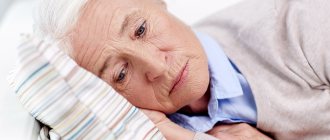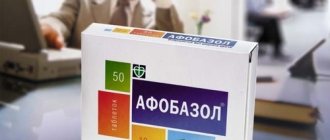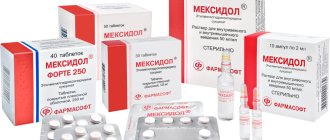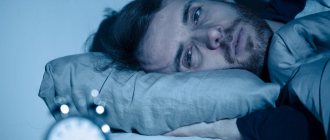special instructions
You should be aware of the possibility of drug interactions:
- The effect of drugs is enhanced in combination with other sedatives (neuroleptics, barbiturates, etc.).
- Taken together with M-anticholinergics leads to side effects such as urinary retention, dry mouth, and thirst.
- Drinking alcohol during therapy leads to a pronounced increase in sedative effect, and the development of hallucinations is likely.
You should remember the need to count the sodium salts contained in the medicine (more than 400 mg in 1 tablet) for persons with limited salt intake. During therapy, work with moving mechanisms and work that requires increased mental concentration should be limited.
Donormil
Donormil (doxylamine succinate) is a sleeping pill that has long gained popularity in Western and Central Europe, and in many of these countries it has over-the-counter status. The drug is well absorbed from the digestive tract. Its half-life period is comparable to that of the “luminaries” of the class of sleeping pills - benzodiazepines. The pharmacological “trick” of the drug is rightly considered to be the fact that its active component interacts simultaneously with M-cholinergic and H1-histamine receptors in the central nervous system. This combined effect on the receptor apparatus of the central nervous system provides a powerful hypnotic and sedative effect. Unlike many other drugs in this group, Donormil not only prolongs sleep, but also improves its quality. It does not have a negative effect on the physiological mechanisms of sleep and circadian rhythms. Donormil is used for insomnia and other somnological disorders of various origins. The drug is available in the form of effervescent tablets. The optimal time to take it is 15-30 minutes before going to bed. Donormil will ensure normal sleep for 7-8 hours. With earlier awakening, provoked by various reasons, suppression of psycho-emotional activity may be noted. The drug is intended for course use. The duration of one course is 10 days. The break between courses (if repeated courses are required) is 10–15 days. The drug passed a number of clinical trials with honor. It has been established that it is significantly superior to Diphenhydramine in terms of its hypnotic effect (the study was conducted in dermatological patients suffering from insomnia).
One of the studies was conducted in our country in Moscow clinics. It was found that Donormil has a pronounced hypnotic effect, normalizes sleep structure, without exhibiting clinically significant side effects. The drug reduces the time it takes to fall asleep, increases the duration of sleep in general and the slow-wave sleep phases in particular, is not addictive and, not being a psychotropic drug, is accessible to the widest range of the population. Undesirable side effects are observed only when using submaximal doses: in such cases, increased daytime sleepiness, hyposalivation, and constipation may occur. When using the drug in combination with benzodiazepines, barbiturates, tranquilizers, and opiates, a potentiation of the inhibitory effect on the central nervous system is observed. Donormil copes well with most somnological disorders, because... eliminates the very processes underlying insomnia. After taking it in recommended doses, there is no aftereffect (subjective feeling of weakness, migraine pain, apathy). Donormil is well tolerated, has a favorable safety profile, and does not cause addiction or rebound syndrome. While taking the drug, it is recommended to refrain from activities associated with increased attention and concentration (driving a car, working with machinery).
Donormil 15 mg, 30 film-coated tablets
Registration Certificate Holder
UPSA (France)
Dosage form
Medicine – Donormyl® (Donormyl®)
Description
Film-coated tablets
white, rectangular, with a notch on both sides.
1 tab.
doxylamine succinate 15 mg
Excipients
: lactose monohydrate - 100 mg, croscarmellose sodium - 9 mg, microcrystalline cellulose - 15 mg, magnesium stearate - 2 mg.
Film shell composition:
macrogol 6000 - 1 mg, hypromellose - 2.3 mg, Sepispers AR 7001 (hypromellose - 2-4%, titanium dioxide CI%, propylene glycol - 30-40%, water - up to 100%) - 0.7 mg.
10 pieces. — polypropylene tubes (1) — cardboard packs. 30 pcs. — polypropylene tubes (1) — cardboard packs.
Indications
- transient sleep disturbances.
Contraindications for use
- hypersensitivity to doxylamine and other components of the drug, or to other antihistamines;
- angle-closure glaucoma or family history of angle-closure glaucoma;
- diseases of the urethra and prostate gland, accompanied by impaired urine outflow;
- congenital galactosemia, glucose-galactose malabsorption, lactase deficiency;
- children and adolescents up to 15 years of age.
Carefully:
patients with a history of apnea - due to the fact that doxylamine succinate can aggravate sleep apnea syndrome (sudden cessation of breathing during sleep); patients over 65 years of age - due to possible dizziness and delayed reactions with the risk of falls (for example, during night awakenings after taking sleeping pills), as well as due to a possible increase in T1/2; patients with renal and liver failure (T1/2 may increase).
pharmachologic effect
Histamine H1 receptor blocker from the ethanolamine group. The drug has a hypnotic, sedative and m-anticholinergic effect. Reduces the time to fall asleep, increases the duration and quality of sleep, without changing the sleep phases. Duration of action - 6-8 hours.
Drug interactions
When taking the drug Donormil® simultaneously with sedative antidepressants (amitriptyline, doxepin, mianserin, mirtazapine, trimipramine), barbiturates, benzodiazepines, clonidine, morphine derivatives (analgesics, antitussives), neuroleptics, anxiolytics, histamine H1 receptor blockers with sedative action, central antihypertensive drugs, thalidomide, baclofen, pizotifen enhance the inhibitory effect on the central nervous system.
When taken simultaneously with m-anticholinergic drugs (atropine, imipramine antidepressants, antiparkinsonian drugs, atropine antispasmodics, disopyramide, phenothiazine antipsychotics), the risk of side effects such as urinary retention, constipation, and dry mouth increases.
Because alcohol enhances the sedative effect of most histamine H1 receptor blockers, incl. and the drug Donormil®, it is necessary to avoid its simultaneous use with alcoholic beverages and medications containing alcohol.
Dosage regimen
Inside. 1/2-1 tablet/day, with a small amount of liquid, 15-30 minutes before bedtime. If treatment is ineffective, on the recommendation of a doctor, the dose can be increased to 2 tablets.
Duration of treatment from 2 to 5 days;
If insomnia persists, you should consult a doctor. Patients with renal and hepatic insufficiency:
due to data on increased plasma concentrations and decreased plasma clearance of doxylamine, a downward dose adjustment is recommended.
Elderly patients over 65 years of age:
Histamine H1 receptor blockers should be used with caution in this group of patients due to possible dizziness and delayed reactions with the risk of falling (for example, during night awakenings after taking sleeping pills). In view of data on increased plasma concentrations, decreased plasma clearance and increased T1/2, a dose adjustment downward is recommended.
Overdose
Symptoms:
daytime drowsiness, agitation, pupil dilation (mydriasis), accommodation disturbances, dry mouth, redness of the skin of the face and neck (hyperemia), increased body temperature (hyperthermia), sinus tachycardia, disorder of consciousness, hallucinations, decreased mood, anxiety, impaired coordination of movements , trembling (tremor), involuntary movements (athetosis), convulsions (epileptic syndrome), coma.
Involuntary movements are sometimes a precursor to seizures, which may indicate severe poisoning. Even in the absence of seizures, severe doxylamine poisoning can cause rhabdomyolysis, which is often accompanied by acute renal failure. In such cases, standard therapy with constant monitoring of CPK levels is indicated. If symptoms of poisoning appear, consult a doctor immediately.
Treatment:
symptomatic (m-cholinomimetics, etc.), the use of activated carbon is indicated as a first aid remedy (50 g for adults and 1 g/kg body weight for children).
Side effect
From the digestive system:
constipation, dry mouth.
From the cardiovascular system:
feeling of heartbeat.
From the side of the organ of vision:
visual impairment and accommodation, blurred vision.
From the urinary system:
urinary retention.
From the nervous system:
drowsiness during the day (in this case, the dose of the drug should be reduced); confusion, hallucinations.
From the musculoskeletal system:
Rhabdomyolysis
From the laboratory parameters:
an increase in the level of CPK.
If any of the above side effects worsen or other side effects not listed in the instructions occur, the patient should inform the doctor.
special instructions
It should be taken into account that insomnia can be caused by a number of reasons for which there is no need to prescribe this drug.
The drug has a sedative effect, suppresses cognitive abilities and slows down psychomotor reactions. The first generation of histamine H1 receptor blockers can have m-anticholinergic, α-adrenergic blocking and antiserotonin effects, which can cause dry mouth, constipation, urinary retention, disturbances of accommodation and vision.
Like all sleeping pills or sedatives, doxylamine succinate can worsen sleep apnea (sudden cessation of breathing during sleep) by increasing the number and duration of apnea attacks.
The potential for abuse of first-generation H1 blockers, including doxylamine, can lead to physical and psychological dependence, which has been reported with intentional use of higher doses than recommended.
One tablet of the drug contains 100 mg of lactose monohydrate, which should be taken into account in patients with rare congenital galactose intolerance, lapp lactase deficiency or glucose-galactose malabsorption.
Impact on the ability to drive vehicles and machinery
Due to possible drowsiness during the daytime, you should avoid driving vehicles, working with machinery and other activities that require quick mental and motor reactions.
Storage conditions
The drug should be stored out of the reach of children at a temperature of 15 to 25°C.
Best before date
Shelf life: 3 years. Do not use after the expiration date.
Use during pregnancy and breastfeeding
Restrictions during pregnancy - With caution. Restrictions when breastfeeding - Contraindicated.
Based on adequate and well-controlled studies, doxylamine can be used in pregnant women throughout pregnancy. If the drug is prescribed in late pregnancy, the atropine-like and sedative properties of doxylamine should be taken into account when monitoring the condition of the newborn.
It is not known whether doxylamine passes into breast milk. Due to the possibility of developing a sedative or stimulating effect in a child, breastfeeding should not be done while using the drug.
Use for renal impairment
Restrictions for impaired renal function - With caution.
Use with caution in patients with renal failure (T1/2 may increase).
Use for liver dysfunction
Restrictions for liver dysfunction - With caution.
Use with caution in patients with liver failure (T1/2 may increase).
Use in elderly patients
Restrictions for elderly patients - Use with caution.
Carefully:
patients over 65 years of age - due to possible dizziness and delayed reactions with the risk of falling (for example, when waking up at night after taking sleeping pills).
Use in children
Restrictions for children - With caution. Contraindicated in children and adolescents under 15 years of age.
Terms of sale
The drug is available with a prescription.
Contacts for inquiries
BRISTOL-MYERS SQUIBB (USA)
BRISTOL-MYERS SQUIBB
Representative office in Russia 105064 Moscow st. Zemlyanoy Val, 9 Tel. Fax
Donormil is an over-the-counter medicine for insomnia.
What do many people (men, women, and especially older people) do if they begin to have a sleep disorder that leads to the problem of insomnia? As a rule, they go to the pharmacy and ask the seller to recommend some medicine for insomnia that is sold in pharmacies without a prescription. The salesperson at the pharmacy may recommend buying Melaxen or Donormil tablets. An over-the-counter insomnia medicine, Donormil, is widely known in Russia, has a hypnotic effect, and is excellent in treating acute insomnia and short-term sleep disorders. However, it is more correct to treat insomnia with Donormil, taking into account the recommendations of a qualified doctor treating insomnia, by making an appointment with a somnologist at the Sleep Medicine Center in Moscow to avoid possible side effects. It’s easy to make an appointment at the Somnology Center in Moscow; you can choose a convenient time to see a somnologist for consultation.
Composition of the drug Donormil
A drug based on doxylamine succinite, which promotes rapid and peaceful sleep. One capsule contains 15 mg of doxylamine. The drug is available in two forms: regular tablets and effervescent tablets. The second option, as noted by somnologists at the Somnology Center in Moscow, has a faster hypnotic effect.
And although the drug for insomnia Donormil is available in pharmacies without a prescription, before you start taking the drug, it is important to familiarize yourself with possible contraindications in order to avoid complications. Before prescribing treatment with the drug Donormil, a somnologist in Moscow conducts a set of studies, for example, polysomnography , and draws up an individual treatment regimen for the patient for insomnia.
Sleep Medicine Center in Moscow on the basis of the Rehabilitation Clinic in Khamovniki
The somnology center in Moscow in Khamovniki has everything to treat insomnia in men, women, the elderly, teenagers and children. Polysomnography, cognitive behavioral therapy, CPAP therapy in Moscow are some of the modern methods used by somnologists to treat insomnia in Moscow. The head of the Center for Sleep Medicine at the Rehabilitation Clinic in Khamovniki is Professor, Doctor of Medical Sciences - Roman Vyacheslavovich Buzunov .
–President of the All-Russian public organization “Russian Society of Somnologists”,
–Professor of the Department of Regenerative Medicine and Medical Rehabilitation with courses in pediatrics, nursing, clinical psychology and pedagogy of the Federal State Budgetary Institution of Further Professional Education “Central State Medical Academy” of the Department of the President of the Russian Federation,
–Honored Doctor of the Russian Federation, Doctor of Medical Sciences.
Contacts
Work phone 5.5
Places of work:
Internet resources
www.buzunov.ru – personal website of R.V. Buzunova
www.cpap.ru – website about CPAP therapy
YouTube channel: https://www.youtube.com/user/Buzunov
Instagram: @buzunov_roman
To get advice on the problem of insomnia, you need to make an appointment with a somnologist BUZUNOV ROMAN VYACHESLAVOVICH in Moscow, call: +7 495 77 33 195.
Call:
+7(495) 77-33-195
Leave a request:
How to take Donormil?
It is advisable to take the drug Donormil 45-60 minutes before your planned bedtime. During this time, potent components are absorbed into the blood and cause a feeling of drowsiness. The modern method of pilisomnography, performed at the Sleep Medicine Center in Moscow by experienced somnologists, will provide a more complete picture of the patient’s condition. At the patient’s request, polysomnography in Moscow can be performed at the patient’s home.
It is not recommended to take the drug without first consulting a somnologist in Moscow. If you decide to start taking the drug yourself, do not overdo it with the dosage. For the first time, 0.5 tablets containing 7.5 mg of doxylamine are enough.
The product is designed to treat sleep in cases of short-term disturbances and manifestations of so-called acute insomnia. For example, stress, anxiety, nervousness, increased excitability. Monitor your medication intake for a month. It is advisable to use sleeping pills no more than 8 times a month. If you manage to fall asleep on your own, it is better to refuse drug therapy and not supply your body with pills.
Donormil is sometimes used for complex treatment of insomnia problems along with other drugs and treatment regimens. However, the drug should not be used for more than 4 weeks.
Somnologists at the Moscow Somnology Center in Khamovniki try to select the optimal treatment regimen for insomnia with minimal risks and side effects for the patient. If you notice disturbances or sleep disorders, we recommend making an appointment for a consultation with a somnologist in Moscow. Timely diagnosis, research, and treatment of the body (polysomnography, cognitive behavioral therapy, CPAP therapy) will help avoid serious health consequences.
In what cases does Donormil help?
If the causes of insomnia are stress, psycho-emotional shock, increased excitability, treatment is possible
If the causes of insomnia are discomfort during rest (light, extraneous sounds, noise), treatment is possible
If the causes of insomnia are secondary diseases and pain (acute chondrosis, physical injuries, injuries), treatment is possible
If the causes of insomnia are increased physical and psychological activity, treatment is possible. Excessive overload of the body with physical activity can also cause sleep disorders. In this case, we recommend making an appointment with a somnologist at the Somnology Center in Moscow in Khamovniki and undergoing a comprehensive examination under the guidance of a qualified somnologist. The help of a doctor who professionally treats insomnia minimizes the risks of insomnia on the body.
If the cause of the insomnia problem is short-term insomnia for no reason, treatment is possible. Donormil can be taken as needed, and not taken as a regimen, as many analogues require.
Side effects after taking Donormil
If you constantly take the drug Donormil to treat insomnia, a person may experience lethargy, slow reaction, drowsiness, blurred vision, and dry mouth. It is worth paying attention to the fact that adverse reactions are not observed in all patients taking Donormil to treat insomnia, but only in a few, so a somnologist at the Sleep Medicine Center in Moscow first collects the patient’s medical history and makes a diagnosis.
The drug should not be taken during breastfeeding, angle-closure glaucoma, prostate adenoma, or intolerance to the drug. Each case is individual, all diagnoses should be voiced to a somnologist in order to correctly select a treatment regimen.
Take Donormil with caution
A somnologist at the Sleep Medicine Center in Moscow prescribes the drug individually, taking into account the patient’s activity.
If work requires special concentration, it is better to stop taking Donormil.
During pregnancy, the drug is not contraindicated, but you should not abuse the pills. Sleeping pills can have a negative effect on your baby in the third trimester. If you take Donormil, you should not drink alcoholic beverages, as side reactions and reverse effects are possible. Alcohol and sleeping pills are incompatible.
If you have previously been diagnosed with obstructive sleep apnea, you should take Donormil with extreme caution. It is better to consult in advance with a somnologist at the Somnology Center in Moscow and discuss a treatment regimen.
Failure of the biological clock (
Jet Lag ) in the human body can also cause insomnia problems that require treatment.
In case of short-term deviations, you can take Donormil, having first received the recommendations of a specialist. Test online:
Assess how you feel during the day to see if you have sleep disorders
Test online:
Check if you have sleep apnea
How do Donormil and alcohol work?
Sleeping pills inhibit the activity of areas of the brain responsible for wakefulness. As a result, the person falls asleep. Alcohol also suppresses the functioning of the nervous system. If you take Donormil and alcohol at the same time, their effects will not just add up, but will enhance each other. And not only medicinal ones.
When taking alcoholic beverages and sleeping pills at the same time:
The likelihood of donormil side effects increases.
Especially those effects that are associated with the state of the nervous system: difficulty waking up, poor coordination, disorientation, slow reactions, high risk of injury, inability to engage in activities that require attention.
The risk of developing drug addiction and alcoholism is growing.
This is relevant for those cases when patients neglect the recommendation to take sleeping pills situationally and turn it into a nightly habit. Together, Donormyl and alcohol act faster than separately. Accordingly, after such a “cocktail” a person receives an immediate effect. How to refuse the opportunity to get sleep so easily? This is how people turn into alcoholics or drug addicts.
The quality of sleep deteriorates.
There is an expression: “An alcoholic’s sleep is short and restless.” Falling asleep after drinking alcohol occurs quickly, but the quality of sleep leaves much to be desired. If there is too much alcohol in the “alcohol - donormil” combination, then this may cause deterioration of sleep rather than improvement. It will be intermittent, not refreshing, incomplete.
Make an appointment with a somnologist
+7
Leave a request:









